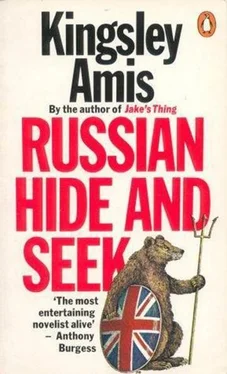Kingsley Amis - Russian Hide-and-Seek
Здесь есть возможность читать онлайн «Kingsley Amis - Russian Hide-and-Seek» весь текст электронной книги совершенно бесплатно (целиком полную версию без сокращений). В некоторых случаях можно слушать аудио, скачать через торрент в формате fb2 и присутствует краткое содержание. Жанр: Современная проза, на английском языке. Описание произведения, (предисловие) а так же отзывы посетителей доступны на портале библиотеки ЛибКат.
- Название:Russian Hide-and-Seek
- Автор:
- Жанр:
- Год:неизвестен
- ISBN:нет данных
- Рейтинг книги:3 / 5. Голосов: 1
-
Избранное:Добавить в избранное
- Отзывы:
-
Ваша оценка:
- 60
- 1
- 2
- 3
- 4
- 5
Russian Hide-and-Seek: краткое содержание, описание и аннотация
Предлагаем к чтению аннотацию, описание, краткое содержание или предисловие (зависит от того, что написал сам автор книги «Russian Hide-and-Seek»). Если вы не нашли необходимую информацию о книге — напишите в комментариях, мы постараемся отыскать её.
A handsome and highly sexed young Russian cavalry officer, Alexander Petrovsky, joins the plot and learns to his regret that politics and playmates don't mix.
"Funny, cynical, captivating-Amis makes an implausible situation almost believable, then lets his characters worry their way out." (B-O-T Editorial Review Board)
Russian Hide-and-Seek — читать онлайн бесплатно полную книгу (весь текст) целиком
Ниже представлен текст книги, разбитый по страницам. Система сохранения места последней прочитанной страницы, позволяет с удобством читать онлайн бесплатно книгу «Russian Hide-and-Seek», без необходимости каждый раз заново искать на чём Вы остановились. Поставьте закладку, и сможете в любой момент перейти на страницу, на которой закончили чтение.
Интервал:
Закладка:
That all the world will be in love with night
And pay no worship to the garish sun,
she seemed to understand and spoke with some conviction, not that that made any difference to the muttering.
The end came, or began, with the re-entrance of the Nurse. The prospect of more of her was suddenly too much to bear. Unlike the church congregation, the people here had thought they had an idea of what was in store for them and been disappointed. They had been looking forward to enjoying themselves and had been bewildered and bored. They had been told over and over again that this was a great play by a great Englishman and there was nothing in it. They had put on these ridiculous clothes and come all this way to be made fools of. It was what some of them had been calling it from the beginning – just another Shits’ trick.
In what followed almost no one took no part and there was no opposing faction within the audience. Shouting, gesticulating, assuring one another that it was no joke and not good enough, they stood up en masse and slowly made their way to the space between the front row and the orchestra pit. The half-dozen Russian-trained stewards were swept helplessly along. The riot police had already been summoned by electronic alarm but it would be several minutes before they could arrive. The crowd appeared indignant rather than menacing and at first contented itself with verbal aggression. From behind the footlights Romeo, Juliet, Capulet, Benvolio, Prince Escalus pleaded and apologised in dumb-show; words would have been wasted. Then some of the younger men from what had been the audience set about climbing up the barrier surrounding the pit with the evident purpose of getting on to the apron and so to the stage proper. Those questioned the next day said they intended no personal harm and meant only to do some damage to the set and properties, but anybody could have been forgiven for deciding to be on the safe side and making his or her exit before it was too late. The players did that.
Alexander, standing in the central aisle halfway down the front of the house, had an excellent view of all this and even more of the events that followed. For a moment the stage was empty. Then Romeo and Benvolio hurried back on to it and down on to the apron. They were shouting violently though inaudibly, inaudibly not only to Alexander but, as it seemed, also to anyone in the crowd; nobody looked at them. And they were shouting a single word, a monosyllable to judge by the movements of their mouths. He wondered very much what that word was. Nor did he have to wait long to find out. In the most spectacular fashion, a cloud of smoke, dense and spreading with remarkable rapidity, drifted into his view from behind the flats of Capulet’s orchard. Very briefly it was his view alone. During that interval the concealed door next to the stage, the one by which Aram Sevadjian and Theodore had come to join him at the rehearsal he had visited, was opened from the far side. Actors among others began to come through that doorway, a minor Montague, a minor Capulet, one of the Prince’s train, a man recognisable as Mercutio. He was certainly recognised by some of those milling about near him, but before he could be assailed or otherwise abused others had seen the smoke, much thicker and more widespread than when it had first appeared.
The shouting stopped, or rather changed into unnecessary but understandable cries of ‘Fire!’ Alexander looked at the stage again. Romeo and Benvolio were nowhere to be seen; they could only have descended into the auditorium. One after the other Prince Escalus, a man who might have been a stage-hand, a girl who might have been anything, Capulet came into sight and clambered down from the stage, presumably unable to make their way to the pass-door Mercutio’s party were using. Where was Sarah? Here at last she was, still dressed as Juliet, running, coughing, carrying a hold-all. In her turn she reached the apron and started to negotiate the gap between it and the barrier, but she was impeded by her hold-all, lost her footing and in a flash had fallen through the gap into the orchestra pit. Alexander acted nearly as quickly. He had moved along one of the rows of seats so as not to be in the path of the multitude surging up the aisle; now he scrambled over into the next row down and repeated the process until he reached the front. It was no great business for one of his physique to force his way through the press and haul himself up on the barrier so as to be able to see over it.
The floor of the pit, into which smoke was rapidly drifting, was perhaps two metres below him. Sarah Harland, coughing and gasping, half-lay on it struggling to get up but, no doubt because of her fall, without success. She saw him at once, recognised him and silently but unmistakably entreated him to help her. He considered. He would have no trouble getting in and very little trouble getting her out. The trouble would come when he tried to get out himself. She could not help him, nobody else would and there was no furniture in the pit at all, nothing to stand on. He would have to rely entirely on the strength of his arms, and whether he could make it would depend on how far he found he had to reach up. From where he was it looked as if it might be too far. It just might be; that was enough. His decision must have shown in his face, because on to hers came a look of totally unsurprised contempt, a terrible look that was to haunt him till the day he died. He turned away to search for Kitty, for whom after all he was much more responsible.
Huge rounded masses of smoke piled on one another were sailing up the front of the house. The safety curtain, its mechanism failed or its operator fled, was less than half lowered; flames were moving down stage towards it. To be sure, it would not have saved Sarah Harland even if it had come all the way. She died of asphyxiation a few minutes after Alexander had left her, the only fatal casualty of the ‘Romeo and Juliet’ fire. It was soon established that this had been started deliberately, but the perpetrator was never found, nor even his motive placed beyond dispute. An adverse critic of the performance so terminated would have had no time to assemble his materials; a straight saboteur of the Festival might have been expected to pick a time when the building was empty. The most popular theory was that the culprit had been a crazed pre-war set on punishing the cast, the theatre staff, the audience and everybody concerned for having, in different ways, collaborated with the oppressor; he would have counted (rightly) on giving them all a good scare and could not have been expected to shed any tears if many more than one person had died. Again, no evidence for this view was discovered.
On the night of the fire Alexander returned to quarters; troop inspection 0800 hours on the morrow. Although it was still early the mess was deserted. This displeased him; for once he hankered for companionship. At the bar he took a bottle of beer from the shelf, put it back and poured himself a stiff vodka. The following afternoon would see his vital session with Mrs Korotchenko; his thoughts were soon fixed entirely on that. She had her imperfections, but for capturing and holding the attention, even at a distance, she was most effective.
18
At seven o’clock the next morning four officers were breakfasting in ‘B’ Squadron mess: Alexander, Victor, Dmitri and Vsevolod, the aggressive Byelorussian who had been flown in to replace Leo. Boris had already eaten and left to start his day’s work; Major Yakir and George, the second-in-command, were not yet down. The sunlight streamed in through the farmhouse windows cheerfully enough, and yet the prevailing mood was not in the least cheerful: restless, even nervous, under the influence perhaps of the high humidity, the falling atmospheric pressure and the unnatural stillness of the air, all unalleviated by a heavy downpour in the small hours. Dmitri seemed to be the least affected by these intangibles, helping himself to a second coddled egg from the folds of a napkin in the basket before him, skimming through the day’s edition of ‘Angliskaya Pravda’ and finding matters of interest in it. An item on the back page drew a grunt of surprise from him.
Читать дальшеИнтервал:
Закладка:
Похожие книги на «Russian Hide-and-Seek»
Представляем Вашему вниманию похожие книги на «Russian Hide-and-Seek» списком для выбора. Мы отобрали схожую по названию и смыслу литературу в надежде предоставить читателям больше вариантов отыскать новые, интересные, ещё непрочитанные произведения.
Обсуждение, отзывы о книге «Russian Hide-and-Seek» и просто собственные мнения читателей. Оставьте ваши комментарии, напишите, что Вы думаете о произведении, его смысле или главных героях. Укажите что конкретно понравилось, а что нет, и почему Вы так считаете.












